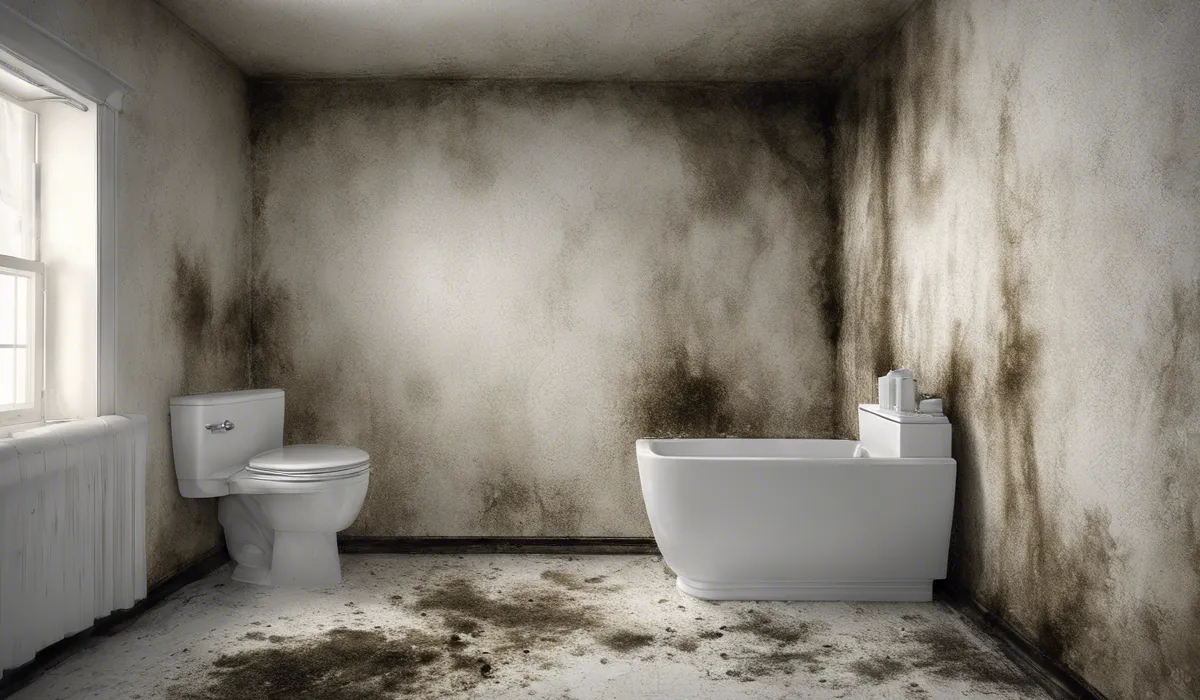If you keep smelling mold, there might be hidden mold growth in your environment due to moisture issues. It’s important to identify and remediate any mold sources promptly, as prolonged exposure can affect health. Consult a professional for thorough inspection and removal.
Potential Causes of Persistent Mold Odor

Locating Hidden Mold in Your Environment
Detecting a persistent mold odor can often be traced back to real mold lurking somewhere in your home.
Mold thrives in damp and unventilated areas, which can be out of sight, like behind walls or under carpets.
It’s essential to investigate damp areas in your home for any signs of mold growth, which can range from visible patches to discoloration on surfaces.
Mold’s Favorite Hiding Spots
Mold can invade spaces within HVAC systems and filters, which then distribute the spores throughout your home. Regular maintenance of these systems is crucial to prevent mold from taking hold.
Additionally, items like old books and antique furniture can harbor mold, giving off a musty smell that permeates the living spaces.
Health Conditions That May Cause Mold Odors
Chronic sinus infections or sinusitis can cause individuals to continuously smell mold, as the sinuses become inflamed and hypersensitive.
Similarly, conditions such as olfactory reference syndrome, where a person perceives smells that aren’t there, or a sensitivity to mold can exacerbate the issue.
Allergy testing for mold spores can help identify if you have a heightened sensitivity to mold.
Understanding Psychological Influences
Psychological factors may also play a role. Phantosmia, an olfactory hallucination, can cause you to smell odors that aren’t present, including mold.
Anxiety and stress can heighten your senses, making you more aware of smells, while traumatic past experiences with mold can trigger a heightened sense of smell for mold.
Investigation and Identification

Inspecting Your Home for Mold
To locate mold, start with a visual inspection of areas prone to moisture, such as bathrooms, kitchens, and basements.
Use your sense of smell to guide you to potential moldy areas. If you suspect mold but can’t find it, consider hiring a professional mold inspector who has the tools and expertise to uncover hidden mold.
The Role of Moisture Control
Controlling moisture in your home is critical for preventing mold growth. Ensure that any water leaks or areas of dampness are promptly addressed.
Using dehumidifiers and maintaining proper ventilation can help keep the humidity levels in your home in check, making it less hospitable for mold.
Seeking Professional Health Evaluations
Consult a medical professional if you suspect health-related causes for the mold odor.
They may recommend allergy testing or a neurological assessment if phantosmia is suspected to determine the root cause of your symptoms.
Remediation and Prevention Strategies

Implementing Mold Removal Techniques
Cleaning surfaces with mold-killing products is a good first step. However, for extensive mold issues, it may be necessary to bring in professional mold remediation services.
These experts can safely and effectively remove mold from your home, ensuring that it does not return.
Home Maintenance to Prevent Mold
Regular cleaning and dusting can reduce mold spores in the home. Keep indoor humidity levels low and ensure that your home has good air circulation to discourage mold growth.
Simple actions like opening windows and using exhaust fans can make a significant difference.
Protecting Personal Health and Well-being
If underlying health issues are contributing to your mold odor problem, seek appropriate treatment.
Managing stress and seeking psychological support if needed can also alleviate symptoms.
Lifestyle changes, such as reducing exposure to damp environments, can help prevent mold-related health problems.
FAQs About Mold Smell Detection
Why do I keep smelling mold in my house?
If you continuously smell mold in your house, it likely indicates the presence of hidden mold growth due to unresolved moisture problems.
What should I do if I smell mold but can’t see it?
When you smell mold but cannot find it, you should consult a mold remediation professional to conduct a thorough inspection of your home.
Can the smell of mold affect my health?
Yes, the smell of mold can be an indicator of spores in the air, which may affect health if exposure is prolonged.
How can I tell if there’s mold hidden in my walls or floors?
You may need to look for signs such as a persistent musty odor, discoloration, or water damage, and ultimately have a professional assessment to detect hidden mold.
What are the common causes of mold smell in a home?
Common causes of a mold smell in a home include high humidity, water leaks, condensation, and poor ventilation that lead to excess moisture and mold growth.
Final Thoughts
Persistent mold odor often indicates hidden mold growth due to moisture problems. It’s crucial to address this promptly to avoid health issues.
Professional inspection and mold removal are recommended to ensure the environment is safe and healthy.
